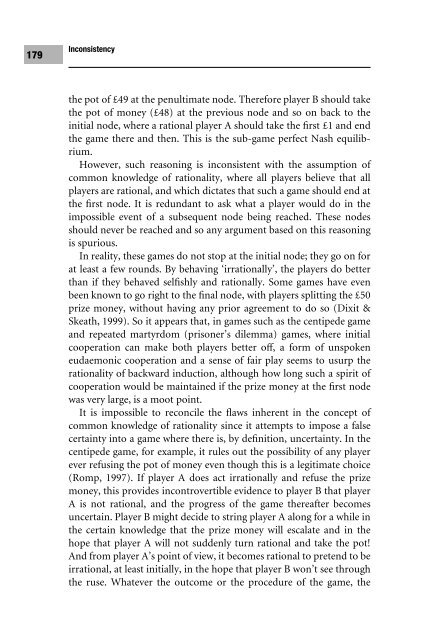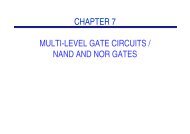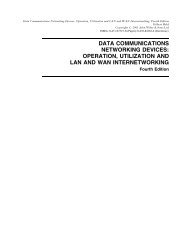Decision Making using Game Theory: An introduction for managers
Decision Making using Game Theory: An introduction for managers
Decision Making using Game Theory: An introduction for managers
- No tags were found...
You also want an ePaper? Increase the reach of your titles
YUMPU automatically turns print PDFs into web optimized ePapers that Google loves.
179Inconsistencythe pot of £49 at the penultimate node. There<strong>for</strong>e player B should takethe pot of money (£48) at the previous node and so on back to theinitial node, where a rational player A should take the Wrst £1 and endthe game there and then. This is the sub-game perfect Nash equilibrium.However, such reasoning is inconsistent with the assumption ofcommon knowledge of rationality, where all players believe that allplayers are rational, and which dictates that such a game should end atthe Wrst node. It is redundant to ask what a player would do in theimpossible event of a subsequent node being reached. These nodesshould never be reached and so any argument based on this reasoningis spurious.In reality, these games do not stop at the initial node; they go on <strong>for</strong>at least a few rounds. By behaving ‘irrationally’, the players do betterthan if they behaved selWshly and rationally. Some games have evenbeen known to go right to the Wnal node, with players splitting the £50prize money, without having any prior agreement to do so (Dixit &Skeath, 1999). So it appears that, in games such as the centipede gameand repeated martyrdom (prisoner’s dilemma) games, where initialcooperation can make both players better oV, a <strong>for</strong>m of unspokeneudaemonic cooperation and a sense of fair play seems to usurp therationality of backward induction, although how long such a spirit ofcooperation would be maintained if the prize money at the Wrst nodewas very large, is a moot point.It is impossible to reconcile the Xaws inherent in the concept ofcommon knowledge of rationality since it attempts to impose a falsecertainty into a game where there is, by deWnition, uncertainty. In thecentipede game, <strong>for</strong> example, it rules out the possibility of any playerever ref<strong>using</strong> the pot of money even though this is a legitimate choice(Romp, 1997). If player A does act irrationally and refuse the prizemoney, this provides incontrovertible evidence to player B that playerA is not rational, and the progress of the game thereafter becomesuncertain. Player B might decide to string player A along <strong>for</strong> a while inthe certain knowledge that the prize money will escalate and in thehope that player A will not suddenly turn rational and take the pot!<strong>An</strong>d from player A’s point of view, it becomes rational to pretend to beirrational, at least initially, in the hope that player B won’t see throughthe ruse. Whatever the outcome or the procedure of the game, the
















